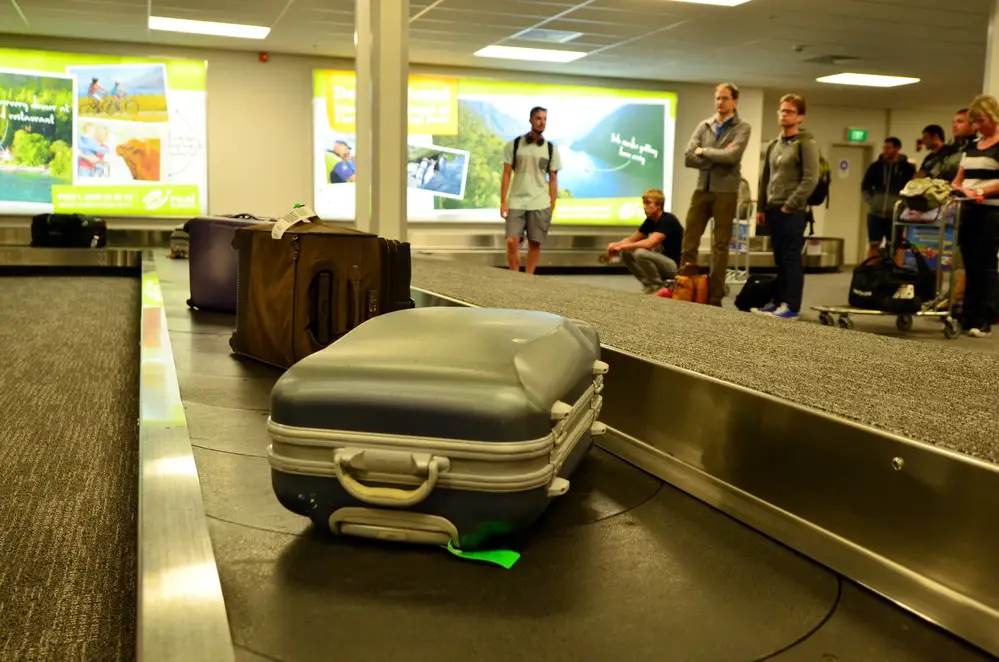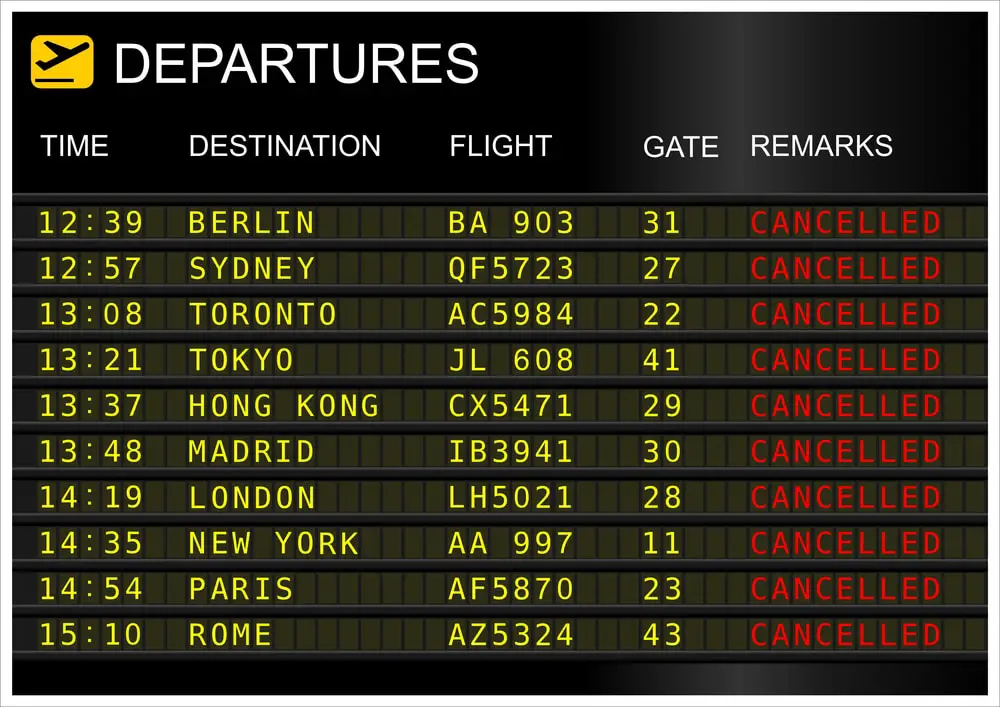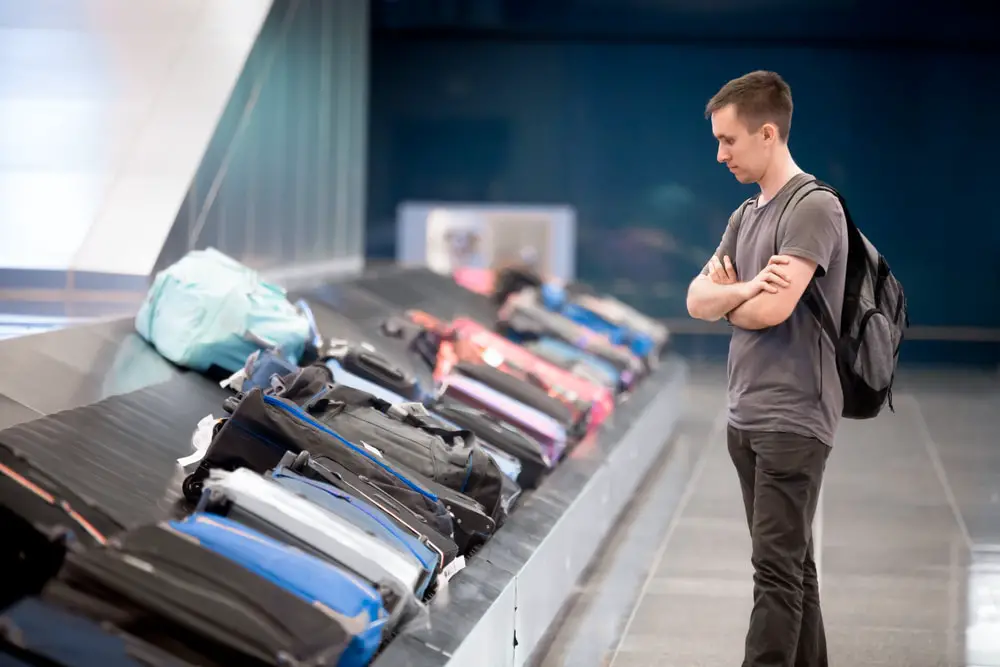Booking a long flight can be stressful, and it gets even more stressful when you need to figure out what bags to check and how to make sure those bags travel with you to your destination. Whether you have a layover, an overnight connection, or a canceled flight, this article will make sure you understand what you need to know about luggage, checking bags, and more to make your next trip as easy as possible.
Table of Contents
Do I Have to Pick up My Luggage on a Connecting Flight?

Whether or not you have to pick up your luggage on a connecting flight depends on where you are flying and the type of ticket you have. First, your destination will determine if you need to pick up your luggage before your connection.
If you are flying within the same country, the airline will check your bags to your final destination. But, some countries require you to pick up your bag after you go through customs and recheck it.
For example, if you are flying into the United States from another country and have a connecting flight, you will need to pick up your bags after passing through customs. After you have your bags, you can recheck them before you go to your connecting flight.
Whenever you are flying somewhere where you need to pass through customs before your layover, you will need to check with the airline or the airport to determine whether or not you will need to get your bag on your layover.
Second, your ticket type will determine whether or not you need to pick up your luggage. If you are flying the same airline on both of your flights, you will not need to pick up your luggage because they will automatically check it to your final destination. The only exception to this is in the case of customs above.
If you are flying two different airlines, you will need to pick up your luggage during your connection and recheck it with the second airline. You might have two separate airlines when you book separate tickets, which is uncommon, so many people do not have to worry about this.
Do You Have to Recheck Luggage on Layovers?
Checking your luggage on layovers is very similar to checking your luggage for connecting flights. If you have a short layover, you will not have time to recheck your luggage, so you need to make sure that the airline is checking your luggage to your final destination.
If you have an overnight layover, you can request the airline check your bags to your final destination or that they give them to you for your layover. If you are staying in the airport, it is easiest to check your luggage to your final destination, but if you are leaving the airport for the night, decide whether or not you need your luggage during your layover.
Suppose you have a layover between two flights on separate airlines. In that case, you will need to recheck your luggage during your layover unless the flights are booked on the same reservation, and the airlines will figure it out amongst themselves.
If you do need to recheck your luggage on your layover, make sure that your layover is long enough that you have time to get your luggage from baggage claim, recheck your luggage with your airline, and go back through security before finding your next flight.
Do You Have to Pay Twice for Baggage on a Connecting Flight?
In most situations, you do not need to pay twice for baggage on a connecting flight. Just because you are flying on two flights does not mean that you need to pay twice for your baggage. Having two flights with a connection is unlike roundtrip flights where you need to pay for your baggage going to your destination and on the way back.
You will need to pay twice for your baggage if you are flying on two separate airlines or have booked separate tickets for your layover. If this happens, you will need to pay for your baggage with each airline or for each ticket that you have.
What Happens to Checked Bags if a Flight is Canceled?

What happens to your checked bags depends if your flight is rescheduled or if it is completely canceled. Airlines have a protocol that they follow regarding baggage when a flight is canceled since the most important thing is to get another flight or plane for all the passengers.
If your flight is being rescheduled for later in the day or the next day, your checked bags will be kept by the airline. It is easiest for them to leave the bags on the plane or move them to your new plane if necessary. You will want to keep your most important items in your personal or carry-on bag if this happens.
If your flight has been completely canceled without being rescheduled, your checked bags will be returned to you just as they would if your flight happened. You will need to go to the baggage claim to get your bag before figuring out what to do about your canceled flight.
Either way, the airlines will typically return all the bags to the customers or leave all of the bags on the plane. It is too much of a hassle to find a single bag among all the others and remove it from the plane or check it for another flight.
What Happens to Checked Bags During an Overnight Layover?
What happens to your checked bags on an overnight layover will usually depend on the airline. Just like in the sections above, if you are flying on two separate airlines, you will need to claim and recheck your baggage on an overnight layover.
With many airlines, you can request what you want to happen with your checked bags during your layover. If you do not need them overnight, you can check the bags to your final destination. Checking your bags to your final destination is the easiest option, so you do not need to worry about picking them up and rechecking them.
If you want your bag with you overnight, you can request to pick up your bag after your first flight. You would pick it up at the baggage claim as you would any other time. You will need to recheck your bag in the morning before going through security to your flight the next day.
Many airlines will require you to recheck your bags if your layover is longer than twelve hours.
Do I Need to Check My Bags?
No, you do not have to check bags if you do not have a lot of stuff to bring on a short trip or are not bringing any luggage. If you can, you only need to bring a carry-on bag, but you are limited in what you can bring in your carry-on and how big it can be.
The most important thing to remember when deciding whether or not to check your luggage is when you have liquids. Any liquids that you do not check, meaning you take them through security, have to be smaller than 3.4 ounces or 100 milliliters in size. The liquid rule includes water bottles, bathroom items, other beverages, and anything else in liquid form.
You can find the full list of items that can travel in carry-on bags and what items need to be in a checked bag on the TSA website.
Second, airlines limit the weight and size of bags brought onto the plane as your carry-on item. All airlines require carry-on bags to be smaller than checked bags, and the size will vary depending on the airline.
For example, United Airlines requires your carry-on bag to be smaller than 9 inches by 14 inches by 22 inches, and this is standard for most other airlines. As for checked bags, the size and weight will depend on your flight and your ticket type, so you always want to check with the airline.
Each airline has its own carry-on and checked bag policies and limits, so be sure to check with your specific airline before the day of your flight.
If you need to condense your items down to fit into a single or smaller bag, vacuum storage bags can do wonders. Check out our review of the best travel vacuum storage bags for vacation.
Do I Always Need to Pay for Checked Bags?
No, you will not always need to pay for your checked bags depending on the type of ticket you buy, any special status you may hold, certain airline credit cards, or frequent flyer status.
First, many tickets include at least one or two checked bags with the fare. These tickets are usually international flights, business class and first-class tickets, and many long-haul domestic flights.
Additionally, if you have a certain ticket status, you will likely get at least one checked bag free. First, airlines offer perks like free bags to some military members and families traveling with young children. These benefits vary by airline, but if you have a special status or young member in your family, check with the airline before paying for baggage.
Finally, frequent flyers often benefit from their preferred airline with free checked bags as a thank you for flying with them often. This benefit will depend on the airline and your status with them. You can compare frequent flyer programs to determine which ones have free checked bags if that is an important benefit for you. Airline credit cards also often have a free checked bag on any flight you purchase using your credit card.
If you do need to pay to check your bags, you can always save money by paying to check your bags online before the day of your flight. Every airline has different fees for different flights, which you can easily find on their website or with your ticket information.
Checking bags can be necessary and convenient, but it can also be expensive. But, there are other ways that you can travel on a budget. If you are looking to save money, check out our tips to save you money when you travel.
Final Thoughts
Having to check bags when you fly can sound like a big hassle, but it is worth the effort to do your research ahead of time and know when and where you need to pick up your bags. If you are flying with a connecting flight, check with the airline or airlines about when you need to claim and possibly recheck your luggage.
Most of the time, airlines make it easy for you to check bags, and you will not need to worry about them until you reach your final destination unless you need to go through customs or switch airlines.

